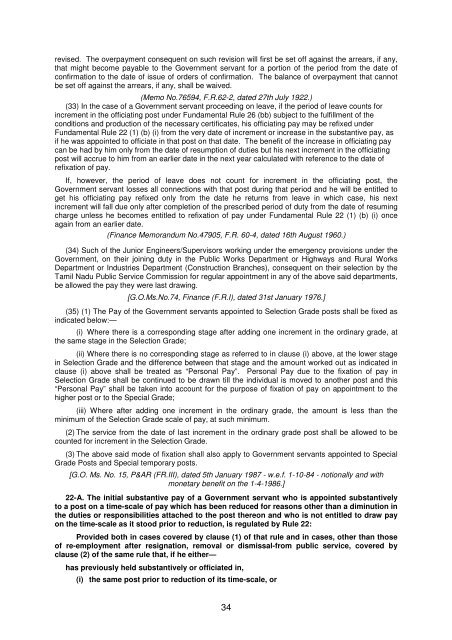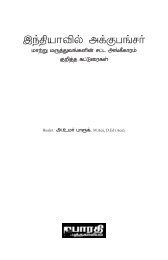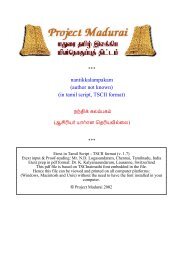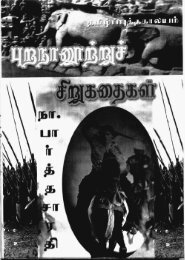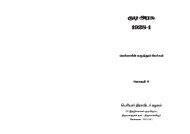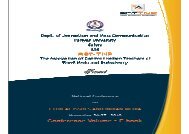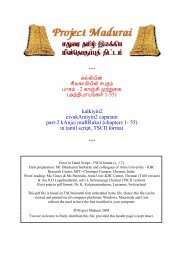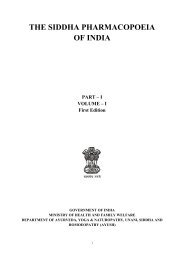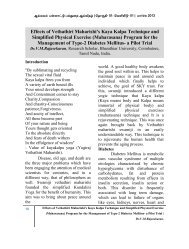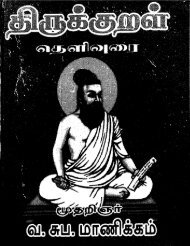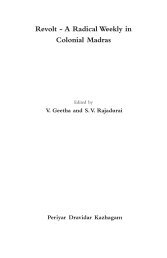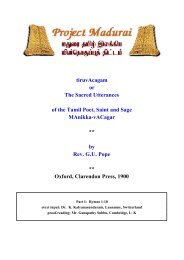THE FUNDAMENTAL RULES OF THE TAMIL NADU GOVERNMENT
THE FUNDAMENTAL RULES OF THE TAMIL NADU GOVERNMENT
THE FUNDAMENTAL RULES OF THE TAMIL NADU GOVERNMENT
- No tags were found...
Create successful ePaper yourself
Turn your PDF publications into a flip-book with our unique Google optimized e-Paper software.
evised. The overpayment consequent on such revision will first be set off against the arrears, if any,that might become payable to the Government servant for a portion of the period from the date ofconfirmation to the date of issue of orders of confirmation. The balance of overpayment that cannotbe set off against the arrears, if any, shall be waived.(Memo No.76594, F.R.62-2, dated 27th July 1922.)(33) In the case of a Government servant proceeding on leave, if the period of leave counts forincrement in the officiating post under Fundamental Rule 26 (bb) subject to the fulfillment of theconditions and production of the necessary certificates, his officiating pay may be refixed underFundamental Rule 22 (1) (b) (i) from the very date of increment or increase in the substantive pay, asif he was appointed to officiate in that post on that date. The benefit of the increase in officiating paycan be had by him only from the date of resumption of duties but his next increment in the officiatingpost will accrue to him from an earlier date in the next year calculated with reference to the date ofrefixation of pay.If, however, the period of leave does not count for increment in the officiating post, theGovernment servant losses all connections with that post during that period and he will be entitled toget his officiating pay refixed only from the date he returns from leave in which case, his nextincrement will fall due only after completion of the prescribed period of duty from the date of resumingcharge unless he becomes entitled to refixation of pay under Fundamental Rule 22 (1) (b) (i) onceagain from an earlier date.(Finance Memorandum No.47905, F.R. 60-4, dated 16th August 1960.)(34) Such of the Junior Engineers/Supervisors working under the emergency provisions under theGovernment, on their joining duty in the Public Works Department or Highways and Rural WorksDepartment or Industries Department (Construction Branches), consequent on their selection by theTamil Nadu Public Service Commission for regular appointment in any of the above said departments,be allowed the pay they were last drawing.[G.O.Ms.No.74, Finance (F.R.I), dated 31st January 1976.](35) (1) The Pay of the Government servants appointed to Selection Grade posts shall be fixed asindicated below:—(i) Where there is a corresponding stage after adding one increment in the ordinary grade, atthe same stage in the Selection Grade;(ii) Where there is no corresponding stage as referred to in clause (i) above, at the lower stagein Selection Grade and the difference between that stage and the amount worked out as indicated inclause (i) above shall be treated as “Personal Pay”. Personal Pay due to the fixation of pay inSelection Grade shall be continued to be drawn till the individual is moved to another post and this“Personal Pay” shall be taken into account for the purpose of fixation of pay on appointment to thehigher post or to the Special Grade;(iii) Where after adding one increment in the ordinary grade, the amount is less than theminimum of the Selection Grade scale of pay, at such minimum.(2) The service from the date of last increment in the ordinary grade post shall be allowed to becounted for increment in the Selection Grade.(3) The above said mode of fixation shall also apply to Government servants appointed to SpecialGrade Posts and Special temporary posts.[G.O. Ms. No. 15, P&AR (FR.III), dated 5th January 1987 - w.e.f. 1-10-84 - notionally and withmonetary benefit on the 1-4-1986.]22-A. The initial substantive pay of a Government servant who is appointed substantivelyto a post on a time-scale of pay which has been reduced for reasons other than a diminution inthe duties or responsibilities attached to the post thereon and who is not entitled to draw payon the time-scale as it stood prior to reduction, is regulated by Rule 22:Provided both in cases covered by clause (1) of that rule and in cases, other than thoseof re-employment after resignation, removal or dismissal-from public service, covered byclause (2) of the same rule that, if he either—has previously held substantively or officiated in,(i) the same post prior to reduction of its time-scale, or34


